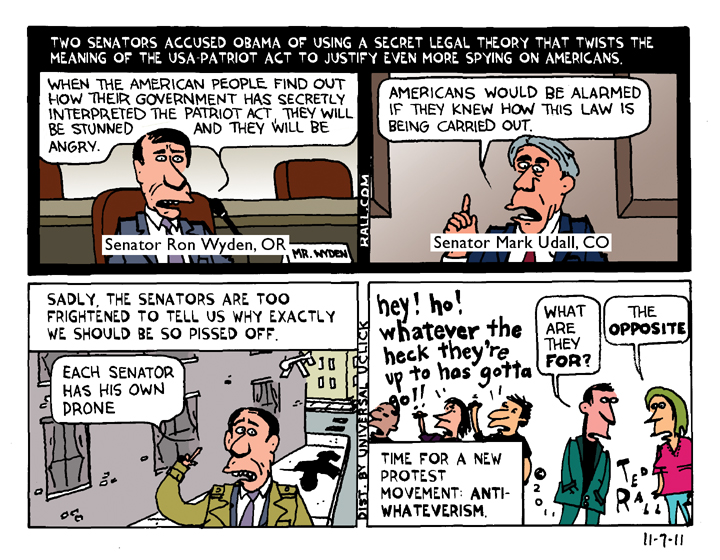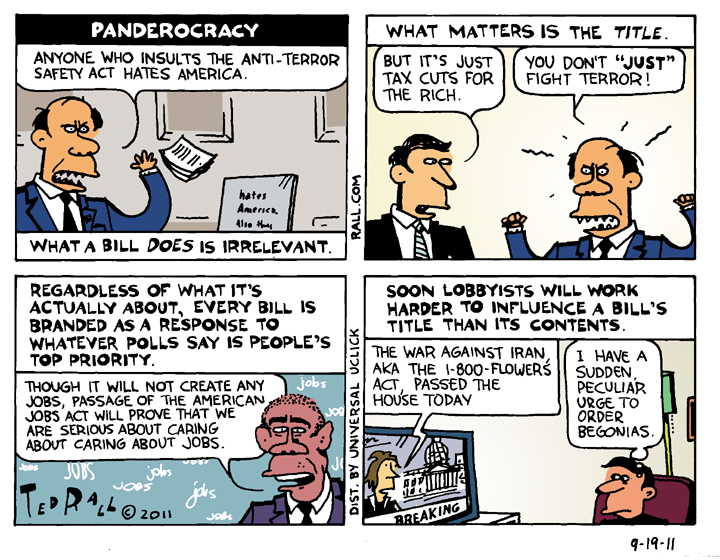
- My vote is a personal endorsement. It says, “I, citizen Ted Rall, approve of Joe Biden’s career in public office.” I do not. Voting for Biden would be a retroactive endorsement of his vote to invade Iraq, which killed over 1 million innocent people. Voting for Biden would be a retroactive endorsement of his long history of racism, beginning with his disgusting opposition to court-ordered busing.
- Biden has never apologized for his numerous right-wing policy positions, such as writing the fascist USA-Patriot Act and the 1994 crime bill that expanded mass incarceration of Black men. Biden’s refusal to apologize indicates that he still believes he did the right thing, and that he would do them again in the future. Why should I forgive him? He has never asked for forgiveness.
- Joe Biden lies a lot. He falsely claimed to hold three bachelor’s degrees and to have graduated at the top of his law school class with a full scholarship. He falsely claimed to have come from a family of coal miners in Northeastern Pennsylvania. He plagiarized in law school and when he wrote his speeches. He said he was arrested with Nelson Mandela; it didn’t happen. During his recent debate against Bernie Sanders, he looked Sanders and the American people in the eye and falsely claimed not to have repeatedly supported the Hyde Amendment, which bans federal funding of abortion. One of the biggest reasons to despise Trump is that he lies so often. What’s the point of replacing one liar with another?
- Even in the middle of a viral pandemic, Biden says he would veto Medicare For All if a bipartisan Congress were to pass such a bill. 5 million Americans were without health insurance before COVID-19. That number has more than doubled due to coronavirus lockdown-related unemployment. I cannot vote for anyone who wants my fellow Americans to die of COVID-19, and that goes double when the murderer is motivated by corruption: of the approximately 20 candidates in the 2020 Democratic primaries, Joe Biden received the biggest contributions from the healthcare industry.
- Joe Biden wants to kill the planet. He still refuses to support a Green New Deal whose goal is zero net carbon emissions by 2030. He wants to do it by 2050. Way too late! Climate change experts say that human civilization may be extinct by then. I cannot vote for anyone who wants everyone on earth to die from climate apocalypse. Here too, Biden has been corrupted by giant contributions by oil and natural gas energy companies.
- Biden refuses to name his cabinet. Given his advanced age — he would be the oldest person ever elected president — his supporters say a cabinet of “best and brightest” department secretaries would pick up the slack as Biden’s mental abilities continue to fade. If that’s true, what are those names? Unless he proves otherwise, before the election, we have to assume a Biden Administration will be run by Obama-era corporate hacks, not one of whom was liberal. You shouldn’t hope for the best from someone who still has Laurence Summers, an idiot who thinks that women aren’t smart enough to be scientists, on speed dial.
- Whether or not you believe that the DNC conspired to install Joe Biden as the nominee, a vote for Biden is a vote for a conservative Democratic Party. Consider what will happen if Biden wins with substantial progressive support. Internal pollsters will conclude that there’s no need to kowtow to progressive voters because they will vote for a corporatist even if they don’t receive any ideological concessions. The argument is, get rid of Trump first and then push Biden to the left. As MSNBC host Lawrence O’Donnell has said, that’s ridiculous. “If you want to pull the major party that is closest to the way you’re thinking to what you’re thinking, you must show them you are capable of not voting for them. If you don’t show them you’re capable of not voting for them, they don’t have to listen to you.” Voting for Biden would actually resume the party’s push toward the right.
- America deserves more than two parties. Both major parties began small. They never would have grown had 19th century voters been unwilling to ignore the two-party trap and “waste” their votes and financial contributions on organizations that didn’t initially seem to stand a chance. If you don’t believe in either Donald Trump or Joe Biden, vote for and contribute to a smaller party. If you support the lesser of two evils in election after election, don’t complain that a better alternative never emerges.
- Joe Biden is mentally unfit for the presidency. He is clearly suffering from dementia, which is why his campaign is hiding him. Now they’re trying to come up with excuses for him not to debate Trump. If the electorate wants to hand over nuclear launch codes to a man who is senile, let them commit this madness without me.
- Biden’s team thinks that their guy can win without campaigning or articulating an affirmative platform of forward-looking ideas simply because so many of us are disgusted by Trump. They may be correct. But it’s dangerous. If Biden’s non-campaign campaign model is successful, it will be emulated. People will become president without being properly vetted, without the American people getting to know them. Nothing could be less democratic.
I anticipate the usual objection to this essay: but Trump! He’s so crazy and racist and stupid and evil!
All true. But none of Trump’s many shortcomings eclipse the sum total of the concerns raised above. Considering everything, in the aggregate Biden and Trump are equally awful. In some ways, Biden is worse. For me, the conclusion is obvious: don’t vote for either one.
Take to the streets.
(Ted Rall (Twitter: @tedrall), the political cartoonist, columnist and graphic novelist, is the author of the biography “Political Suicide: The Fight for the Soul of the Democratic Party.” You can support Ted’s hard-hitting political cartoons and columns and see his work first by sponsoring his work on Patreon.)







